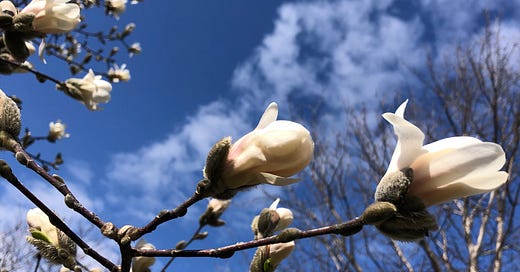On figuring it out at kitchen tables
Concluding our spring series on Elizabeth Alexander's "Praise Song for the Day"
Hello, friends. Welcome back to our spring series on Elizabeth Alexander’s “Praise Song for the Day.”
This week, we’re looking at the final few stanzas, the ones I love the most:
Praise song for struggle, praise song for the day.
Praise song for every hand-lettered sign,
the figuring-it-out at kitchen tables.
Some live by love thy neighbor as thyself,
others by first do no harm or take no more
than you need. What if the mightiest word is love?
Love beyond marital, filial, national,
love that casts a widening pool of light,
love with no need to pre-empt grievance.
In today’s sharp sparkle, this winter air,
any thing can be made, any sentence begun.
On the brink, on the brim, on the cusp,
praise song for walking forward in that light.
I confess: I’m writing to you from a place of discouragement.
The headlines continue to tell us what we all know: the current administration is sowing chaos, fear, pain and confusion in many spheres of American life. None of them, as far as I can tell, live by any maxim as noble as the ones Alexander mentions: there is no love, no consideration of harm, no absence of greed. The mightiest word, for them, is power. (I think about that voiceover from The Fellowship of the Ring, the 2001 film, all the time.)
I’m trying to stay the course: wake up and write and run, go to ZUMIX and tell true stories about our work providing a safe, creative space for young people here in Boston. I am trying.
But: I admit I’m finding it uphill work, these days. It is hard to know where to turn, how to fight, and what—or who—might be targeted next.
This weekend, I ran into my neighbor Rose (hi Rose!) on her way home from a local film festival. She was brimming over with joy creative energy after watching a handful of short films – and a few longer ones – from wildly diverse filmmakers.
“Doesn’t it make you feel great?” she asked. “There are so many creative people out there making stuff, and doing amazing work.” I thought of that when I reread the first stanza here, about “the figuring-it-out at kitchen tables,” and the optimism in a later line where “any thing can be made, any sentence begun.”
Like many of you, I’ve spent countless hours of my life at kitchen tables: eating dinner, telling stories, catching up on the day with family or friends. Growing up, I did math homework and practiced spelling bee words at our kitchen table, and typed papers on our electric typewriter before we bought a bulky desktop computer. My mother insisted on family dinner, as many nights as possible, and so the kitchen table is where we lived, as much as anywhere else in our home.
I’ve had some tough moments, too, at kitchen tables: my marriage imploded rather spectacularly over a kitchen table, in a third-floor apartment over ceramic bowls of soup on a winter night. But even that conversation led—eventually—to some figuring out, painful though it was, and that figuring helped lead me to the life I have now.
I attended a protest a few weeks ago, and we cheered and grinned at the hand-lettered signs, many of which bore clever slogans denouncing the cruelty and recklessness of the current administration. But we also carry signs each summer at ZUMIX’s Walk for Music—a day of joyful celebration and community, with signs that say things like “Music Heals,” “Got Music?,” “Express Yo’Self,” and “Powered By Youth”—the slogan for our FM radio station.
Hand-lettered signs, painted or drawn on discarded cardboard, speak to a down-home earnestness and a personal stake in the matter at hand. Everyone who shows up to Walk for Music—and the recent protests—is out there because they truly care. Alexander is writing about the words we live by, and that, she says, is worth a sign or two.
I appreciate the italicized phrases here, the ones we heard in a classroom or memorized in medical or Sunday school. Many people have a creed, or a handful of words, that sets the tone for their lives. These days, I try to live by some version of tell the truth and be kind, as well as love your people, take deep breaths, drink more water and go for a walk. (The first two phrases dovetail nicely with the two words tattooed on my forearms: beloved and brave.)
What if, Alexander asks, love is mightier than all the other words?
This love is not a soft, sentimental feeling; she’s been writing about work, about farming and building, writing and teaching, and the difficult, tender work of nurturing strong relationships. What if love “beyond marital, filial, national”—a generous love “with no need to pre-empt grievance”—could be our guiding philosophy, our bedrock principle?
What if we set aside greed and profit, and instead asked how we could best build a society whose principles and policies could benefit everyone? If love is the mightiest word, what possibilities might open up for us? What sort of world could we build together?
Alexander invites us to consider that idea. She insists that today—with its “sharp sparkle” of crisp possibility—anything can be made, started, brought into being. She insists, still, on the existence of creativity and joy.
Her words are giving me a scrap of hope as we teeter “on the brink, on the brim, on the cusp” of the kind of society we are always building together. I want to live in a world where justice and love, fairness and open dialogue, are true realities instead of merely lofty principles. Let’s walk forward, together, in that “widening pool of light.”
Thanks for reading, friends. I’d love to hear your feedback, and also what’s helping you walk forward these days, in the comments.





